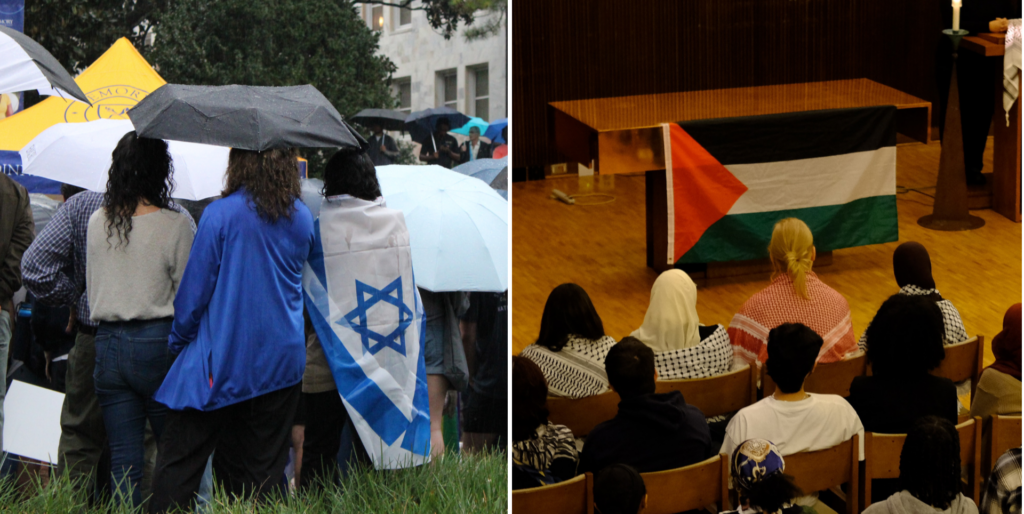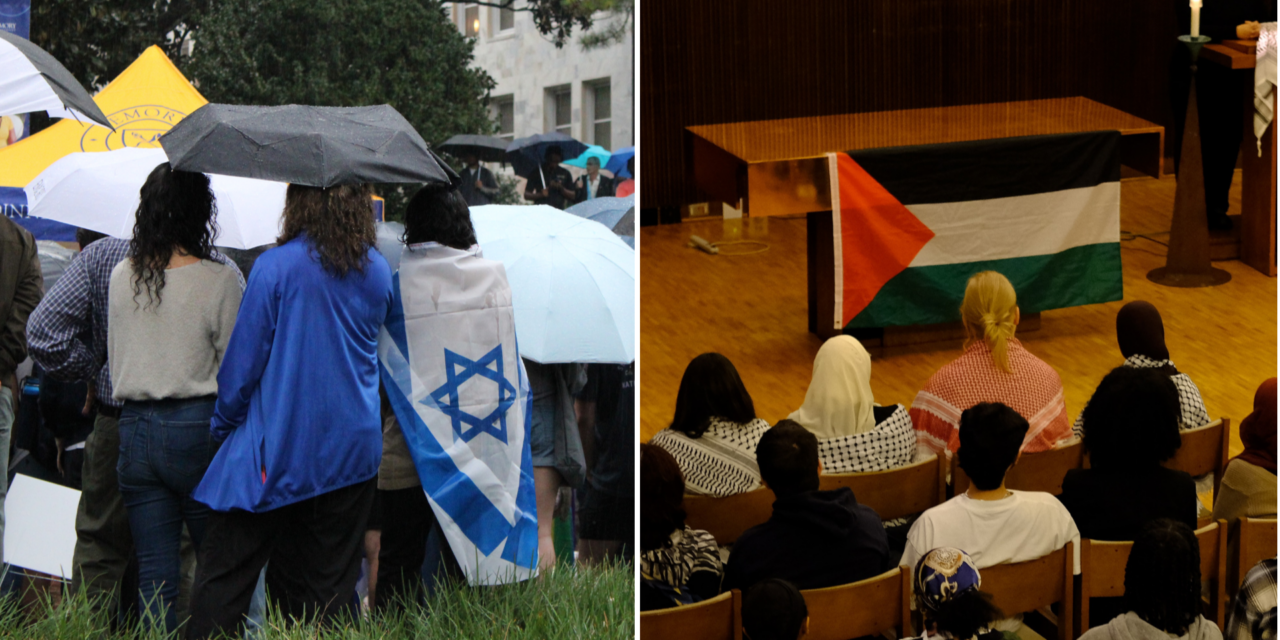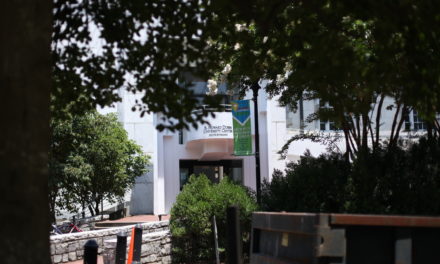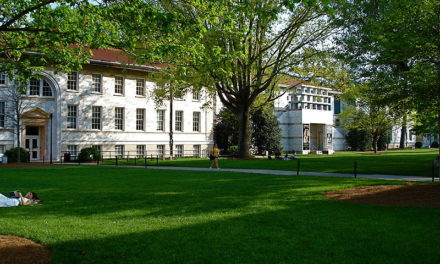U.S. President Joe Biden is visiting Israel this morning after being invited by Israel’s Prime Minister Benjamin Netanyahu. This is Biden’s latest show of support for the country during the recent outbreak of violent conflict in Israel and Palestine, sparked by Hamas’ Oct. 7 attack. His visit is paired with his assignment of around 2,000 military troops to prepare for possible deployment to aid Israel.
Avery Adelman (24C), president of Emory Hillel, expressed support for Biden’s visit.
“Biden is in line with American values for the past 70 years strongly supporting Israel and I support that stance,” Adelman said.
Emory Israel Public Affairs Committee President Sophie Kalmin (26C) said that this trip may be an indicator of political progress, even while it is only “delaying the violence” between Israel and Hamas.
“We’re going the diplomatic route versus the violence route, and to see Biden doing that on behalf of the U.S.-Israel relationship … makes me feel a little bit better,” Kalmin said. “It’s comforting.”
However, a member of Emory Students for Justice in Palestine (ESJP) said she does not expect anything good to come from Biden’s visit. Members of ESJP requested to stay anonymous due to safety concerns.
“Emotionally it’s just been really hard,” the ESJP member said through tears. “The president has already shown who he supports. I don’t expect anything from him going. It’s all talk. It’s always all talk.”
Palestinian Authority President Mahmoud Abbas was originally scheduled to attend the Jordan meeting but canceled after an airstrike blew up a hospital in Gaza, killing at least 500 people. The ESJP member said Biden’s words and actions have sparked Islamophobia across the United States, including the recent murder of a Muslim child in Illinois.
“What the country is realizing, and the administration of the country is realizing, is that this is so much more serious than what they’ve made it out to be,” the ESJP member said. “Because of [Biden] and because of all the words he has said, it has led to this. It has led to the deaths of people in America.”

Students gather under umbrellas on Oct. 11 to mourn Israelis killed in the Hamas attacks (left). Members of the Emory community listen to a speaker during the vigil in honor of Palestine on Oct. 13 (right). (Jenna Daly/Managing Editor and Alya Khoury/Contributing Photographer)
Division on campus
Biden’s planned visit comes amid division on Emory University’s campus about who to support in the conflict.
Assistant Professor of Middle Eastern and Jewish Studies Geoffrey Levin, who also serves as the director of undergraduate engagement for the Tam Institute for Jewish Studies, explained that both Palestinian and Israeli-affiliated students are struggling.
“Many Jewish students feel like their personal mourning has been ignored by friends and professors with the message being that Jewish lives don’t matter,” Levin said. “Many Muslims and Arabs feel like they are taking a huge risk just by saying publicly that Palestinian lives have value and that the broader political context matters.”
Levin emphasized that support does not have to be unilateral, noting that he can express his Jewish identity and recognize that Islamophobia is a major concern at the same time.
“This week, I’m wearing my kippah, in solidarity with Jews who feel vulnerable everywhere, but I also want to emphasize how deeply I care about my Muslim, Arab and Palestinian students,” Levin said.
Alysha Posternak (23C), whose mother is Muslim and father is Jewish, said conversations between students with varying views can be helpful during campus division.
“Something really important is getting people who are both pro-Israel and pro-Palestine to talk to each other and first see each other as friends and understand who they are as a person and then try to understand where they’re coming from,” Posternak said. “A huge issue is people aren’t trying to and don’t want to understand where other people are coming from.”
Adelman, Kalmin and members of ESJP expressed wishes to increase dialogue with Israeli, Jewish, Palestinian and Muslim-affiliated organizations on campus.
“I would really like to start a discussion group between Jewish and Muslim students because Jews and Muslims everywhere — not just on college campuses and certainly not just on Emory’s campus — are very much at a disconnect and do not have bridges built between them, and I don’t think that’s right,” Kalmin said.
Kalmin stated that she met members of the Muslim Students Association and ESJP on Sept. 20 while at the vigil for Libya and Morocco, afterward texting one member to get coffee and another member her contact information, but did not receive a response from either. She said she is still considering whether to reach out again, considering the turmoil that recent escalations in the Israel-Hamas conflict have created.
Members of ESJP affirmed that they would like to organize events with Israeli-affiliated organizations and are considering inviting them to an upcoming viewing and Q&A with the producers of “Israelism,” a film about Jewish identity and the Israel-Palestine conflict.
However, ESJP members expressed that they are hesitant to reach out for fear of backlash. They have reported being subject to “Islamophobic and hateful rhetoric,” including a recent LinkedIn post from a Goizueta Business School alum. In the post, the alum denounced ESJP’s support of the “Free Palestine” movement and referenced members by full name when calling for their potential expulsion from the University.
After the post was released, Kalmin noted that Palestinian students’ perspectives are “equally as valuable” in conversations surrounding the conflict. Members of ESJP expressed similar sentiments, noting that it is important to differentiate between Palestinians and terrorists.
“Our organization, just because it has the word Palestine in its name, people assume that we are connected to terrorist groups, that we wish for the death of groups of people, and all these sorts of things just from the word Palestine,” an ESJP member said. “Palestine is just a place and it’s the home to a really resilient group of people.”
Additionally, Emory Healthcare released a statement on social media on Tuesday, referencing “antisemitic comments” made by an employee on a private social media account. The post did not name the employee, but said they are “one of our assistant professors.”
“We condemn such comments in the strongest possible terms and have immediately placed this individual on administrative leave pending an internal investigation,” the statement read. “As we navigate difficult conversations, our expectation is that all members of the Emory community continue to demonstrate empathy and treat each other with dignity and respect.”
When asked why the Israel-Palestine conflict has been so polarizing on campus, a member of ESJP did not hesitate in her response, referencing University President Greg Fenves’ Oct. 11 email. In this statement, the president expressed support for Israel, condemned Hamas and underscored his personal connection to Israel and Judaism.
“I place a lot of blame on the president of the University for his statement and not even recognizing the Palestinian lives and has yet to recognize the Palestinian lives, as well as any dean at the University,” the ESJP member said.
Adelman said she was “satisfied” with Fenves’ statement. Kalmin also expressed appreciation for Fenves’ strong condemnation of Hamas and acknowledgment of his ties to Israel, but noted that she was disappointed by Business School Dean Gareth James’ and Emory College of Arts and Sciences Dean Barbra Karuthamer’s responses, saying that they could have been stronger.
“[Fenves] did a really beautiful job of calling Hamas what it is and telling the entire Emory community what they needed to hear and that was empathy, seek knowledge, peace and mourning,” Kalmin said.
However, members of ESJP said that they — and other members of the Emory community — felt that the University failed to adequately acknowledge or honor the Palestinians who have been killed in the conflicts. They expressed that the lack of support from the administration has been “unacceptable,” but that the group is working with less senior members of the University administration to help amplify awareness of Palestinian issues.
The members added that it is necessary to increase awareness, alleging that their social media pages have been “shadowbanned,” a term that references a site’s blocking of information posted by a certain account without telling the user.
“It feels like just the word Palestine has become taboo,” one ESJP member said. “Just mentioning the word ‘Palestine’ has gotten people banned from posting their stories. The administration will not mention the word ‘Palestine.’”
Adelman pointed to the passion that members of U.S. universities, including Emory, have for justice across the globe as a reason for the division on campus.
“Jewish students and Arab students are both deeply affected by this,” Adelman said. “We both have long histories related to this land … Our connections to these communities, whether we are connected to our community at home where we went to high school or the community abroad, those don’t fade just because we’re at school.”
Student response
Israel-affiliated organizations and Palestinian-affiliated organizations have separately hosted events to mourn the lives lost in the conflict.
Jewish and Israeli Student groups organized the Oct. 11 vigil honored Israelis killed by the Palestinian militant group Hamas, which the United States, European Union and United Kingdom have designated as a terrorist group. Kalmin attended the vigil and said she was “in tears” during the event.
“It was beautiful and really it was what this community needed,” Kalmin said.
ESJP also hosted a vigil on Oct. 13 to honor the lives lost during the Hamas-Israel conflicts. After the event, several ESJP members said holding a space for Palestinian lives and voices felt powerful.
“I will remember it forever, honestly,” one member said.
Posternak discussed how the current conflict impacts students’ mental health.
“If you just lost someone, or multiple people in some cases, who you really care about, you’re scared that the rest of your friends and family in the region are OK,” Posternak said. “I think that it’s taking a toll on the mental health of a lot of people on this campus.”
Members of ESJP said it is important to take media breaks when feeling overwhelmed, but noted that the people in Israel, Palestine and Gaza cannot take a break from the violence because they are experiencing it every day.
The University and student organizations are offering resources to students struggling with the conflict. Adelman noted that Emory Hillel is open “all day, all week,” while Levin and his department are offering extended office hours to foster conversation and support students.
“Every Emory student deserves to feel safe,” Levin said.
Kalmin also advised students to reach out to their peers during this time and offer support.
“Check in on your Jewish friends,” Kalmin said. “Check in on your Muslim friends. Check in on everyone.”
Managing Editor Madi Olivier (25C) and News Editor Spencer Friedland (26C) contributed to reporting.
Correction (10/18/2023, 12:20 p.m.): A previous version of this story incorrectly stated that U.S. President Joe Biden would visit both Israel and Jordan. It was announced that Biden would not visit Jordan anymore before the time of this story’s publication. The Wheel regrets this error.
Correction (10/19/23, 10:02 a.m.): A previous version of this article stated that Avery Adelman (24C) is the co-president of Emory Hillel. In fact, she is the sole president of Emory Hillel.
Hilary Barkey (she/her) (25Ox) is from New York City and plans on majoring in neuroscience and behavioral biology. When she’s not studying on the Quad, you can find her playing tennis, reading or talking about baseball and hockey to anyone who will listen.







